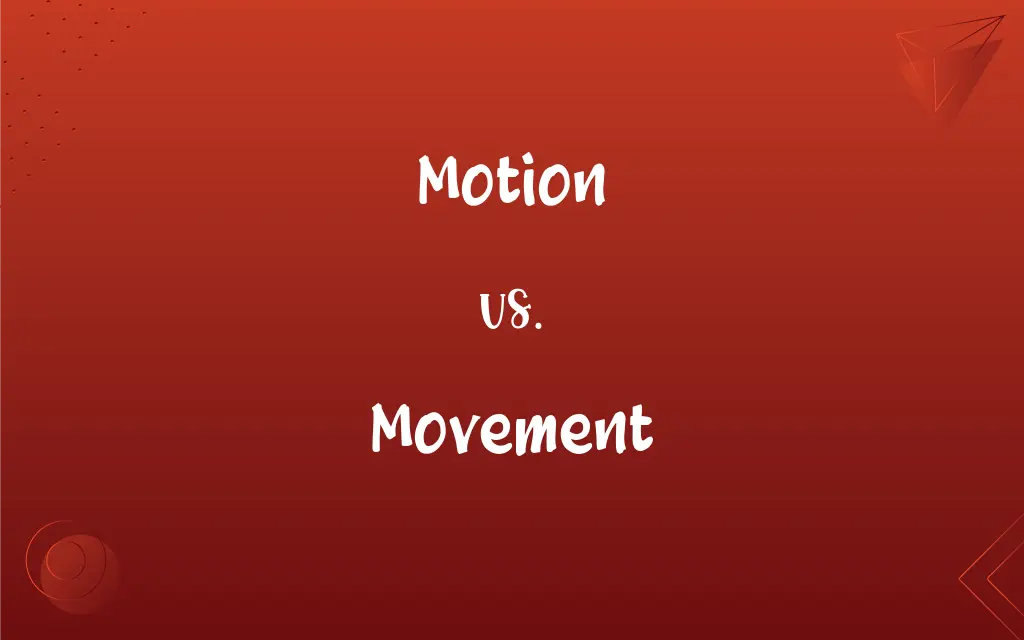Motion vs. Movement: What's the Difference?
Edited by Aimie Carlson || By Harlon Moss || Published on November 22, 2023
Motion refers to the process or action of moving, often in a specific manner or direction, while movement is the act of moving and can also signify a change in position or location.

Key Differences
Motion often implies a specific type of movement, focusing on the manner, direction, or mechanics of moving. Movement, however, broadly refers to any change in position or location, and can be physical or symbolic.
In physics, motion is a precise term describing an object's change in position over time. In contrast, movement can describe physical motion in general terms and also applies to broader concepts, such as social or artistic movements.
Motion can refer to small-scale actions, like the motion of a pendulum. Movement encompasses both small-scale actions and large-scale shifts, like the movement of tectonic plates.
The word motion often connotes a technical or scientific context, whereas movement is used in more varied contexts, from everyday language to describing large-scale social changes.
In legal or formal settings, a 'motion' refers to a formal proposal or request. 'Movement' in such contexts could imply a collective effort or initiative by a group.
ADVERTISEMENT
Comparison Chart
Definition Focus
Specific manner or mechanics of moving
Broad act of moving, physically or symbolically
Usage in Fields
Technical (e.g., physics, mechanics)
Broad and diverse (e.g., social, artistic, physical)
Scale of Action
Often small-scale or specific
Encompasses both small and large-scale changes
Linguistic Context
Technical, scientific
Varied, including everyday and symbolic contexts
Associated Terms
Formal proposal in legal settings
Collective efforts or initiatives in various fields
ADVERTISEMENT
Motion and Movement Definitions
Motion
A mechanical process in machinery.
The motion of the gears kept the clock running.
Movement
A collective effort aiming for social change.
The civil rights movement reshaped society.
Motion
A change in position or location of an object.
The smooth motion of the robot was impressive.
Movement
The act of changing physical location or position.
His sudden movement startled the birds.
Motion
A concept in physics describing movement.
Newton's laws describe the motion of celestial bodies.
Movement
A group initiative or campaign.
The environmental movement gained momentum globally.
Motion
A gesture or signal made by moving part of the body.
She made a motion with her hand to signal silence.
Movement
A bodily function, like muscle movement.
Voluntary movement is controlled by the nervous system.
Motion
A formal proposal in a legal setting.
The attorney filed a motion for a new trial.
Movement
An artistic trend or style in history.
The impressionist movement revolutionized painting.
Motion
The act or process of changing position or place.
Movement
The act or an instance of moving; a change in place or position.
Motion
A meaningful or expressive change in the position of the body or a part of the body; a gesture.
Movement
A particular manner of moving.
Motion
Active operation
Set the plan in motion.
Movement
A change in the location of troops, ships, or aircraft for tactical or strategic purposes.
FAQs
Does motion have a technical connotation?
Often, especially in scientific or legal contexts.
Is motion always physical?
Primarily, yes. Motion refers to the physical act of moving.
Are movements always large-scale?
No, they can be small-scale but often imply a broader impact or change.
Can movement be symbolic?
Yes, movement can also refer to non-physical changes, like social movements.
Can motion refer to a legal term?
Yes, in legal contexts, a motion is a formal proposal or request.
Is every movement a motion?
Technically, yes, but not all motions are referred to as movements.
Can movement be a personal experience?
Yes, movement can refer to personal growth or change.
Can movements be cultural?
Absolutely, movements often refer to cultural or social changes.
Does motion imply direction?
Typically, it suggests a specific direction or type of movement.
Is every group effort a movement?
Not necessarily, but many collective efforts are termed as movements.
Does physics study motion?
Yes, physics extensively studies the principles of motion.
Do artists use the term motion?
Yes, especially when referring to the dynamics of their art.
Can motion be involuntary?
Yes, like reflex motions in the human body.
Do movements always involve many people?
Often, especially in the context of social or cultural movements.
Is a hand gesture a motion?
Yes, it's a type of motion involving body parts.
Can a movement be temporary?
Yes, some movements are short-lived, depending on their goals.
Is motion used in everyday language?
Less frequently, it's more common in specific contexts like physics.
Are motions always observable?
In most cases, yes, especially in scientific contexts.
Are political efforts called movements?
Yes, political or social efforts are often referred to as movements.
Are movements always progressive?
Not always; they can have various objectives and directions.
About Author
Written by
Harlon MossHarlon is a seasoned quality moderator and accomplished content writer for Difference Wiki. An alumnus of the prestigious University of California, he earned his degree in Computer Science. Leveraging his academic background, Harlon brings a meticulous and informed perspective to his work, ensuring content accuracy and excellence.
Edited by
Aimie CarlsonAimie Carlson, holding a master's degree in English literature, is a fervent English language enthusiast. She lends her writing talents to Difference Wiki, a prominent website that specializes in comparisons, offering readers insightful analyses that both captivate and inform.































































